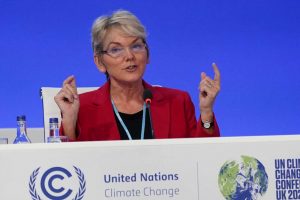Energy crisis shows why the world needs to wean itself off fossil fuels, U.S.'s Granholm says

- Speaking to CNBC's Steve Sedgwick at the COP26 climate change summit on Friday morning, Jennifer Granholm emphasizes the importance of diversifying into clean energy.
- Granholm's remarks come as the first week of the pivotal conference draws to a close.
LONDON — Renewables have an important role to play when it comes to ensuring energy security and safeguarding against the price fluctuations associated with fossil fuels, according to the U.S. energy secretary.
Speaking to CNBC's Steve Sedgwick at the COP26 climate change summit on Friday morning, Jennifer Granholm emphasized the importance of diversifying "into clean energy so that we are not reliant upon the volatility of fossil fuels."
Granholm's comments come at a time when a multitude of factors have led to rising natural gas and oil prices. On Thursday, OPEC and its oil-producing allies agreed to continue with their current output plan, deciding against pumping more crude in the face of multiyear highs in prices and U.S. pressure to help cool the market.
"We saw what OPEC did yesterday, which is to stick to their plan and not increase production," Granholm said. "The bottom line is, for us natural gas is very local … the gas companies, the oil companies have a whole bunch of leases that they're sitting on that they are not producing. And the question is, why is that?"
"It's a doubling down on why we should diversify into clean energy so that we are not reliant upon the volatility of fossil fuels," Granholm added.
Read more about clean energy from CNBC Pro
Bank of America upgrades uranium name Cameco amid renewed interest in nuclear
Bill Gates-backed battery company gets an outperform rating from Cowen
Goldman Sachs picks 6 global stocks set to pop on 'game changer' climate policies
It was put to Granholm that domestic oil production in the U.S. had abated over the last couple of years, even prior to Covid, due to a lack of investment incentives.
"I don't know why at $80 a barrel those incentives are not there," she said. "During Covid, it was down – they backed off because demand was not there because people were staying home, we know that. Now that things are back up, the production should be meeting that [demand], there has been rigs that have been added but not fully," she added.
"The bottom line is, this is … exactly why we should be, as a globe, focusing on getting our resources from the sun, from the wind, from the technology that we've developed in electric vehicles, etcetera."
This represented a longer term strategy, Granholm said, also acknowledging that Europe was currently experiencing a short-term crisis with soaring natural gas prices.
"A lot of that though, again, is based upon geopolitical adversaries or competitors — however you want to describe it — that may be manipulating prices. And do you want to be subject to that long term? No."
European gas prices were up by over 500% between January and October with consumers expected to pay significantly more for their heating this winter. Many officials have blamed Russia for not pumping more gas and have accused President Vladimir Putin of using the commodity as a geopolitical weapon.
Putin has denied the claims and has said the crisis is partly of Europe's own making as the region has opted for short-term spot deals.
Granholm's remarks come as the first week of COP26 draws to a close. The pivotal conference is being hosted by the U.K. in the Scottish city of Glasgow between Oct. 31 and Nov. 12.
—CNBC's Natasha Turak contributed to this article.
Source: Read Full Article
